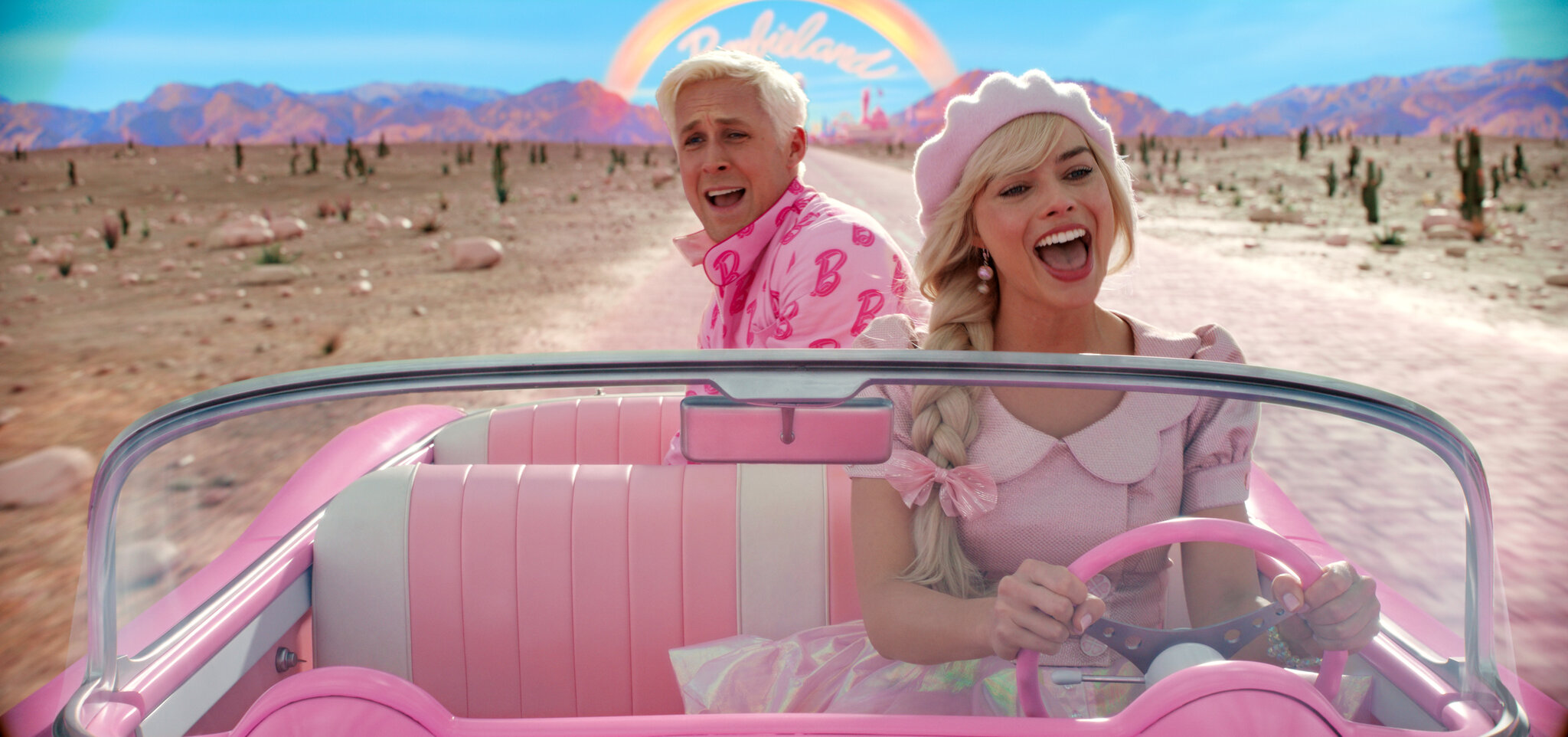A Few Stray Thoughts on the Barbie Movie

I saw it. I wasn’t excited, but I was intrigued. Barbie was written by Greta Gerwig and her husband Noah Baumbach, whom I think one of the more interesting writers working today. Baumbach’s Marriage Story put the fear of God in me like very few movies have. Gerwig’s Frances Ha and Lady Bird both lampooned cliché empowerment and autonomy narratives in delightfully subtle ways. So I saw Barbie. And while I gave up writing real film reviews many years ago, I do have a few stray thoughts to offer.
One. It’s been a long time since I saw a film which wanted to have its cake and eat it, too, quite as badly as this one. Barbie is a film that tries to pass off its inconsistencies as profundities—sort of like ultraviolent action movies which boast they “critique the American obsession with violence.” The droves of women dressing in pink to see the film ought to leave the theater a bit confused about whether they’re being mocked or not. The film’s greatest contradictions concern motherhood. Barbie wants motherhood to be noble, but not more noble than a swinging single life, which is to say that it doesn’t matter what women choose as long as they choose it for shallow reasons. The film’s denouement has two parts, the first of which glibly dismisses motherhood, the second of which drafts on warm, loving images of motherhood to resolve the audience’s desire for something meaningful and sacrificial. Our is an era which often regards the refusal to choose (“Why not both?”) as the height of intellectual spiritual sophistication. A bygone era would have termed such refusals as cowardice or timorousness.
Two. I’ll wager a spate of think pieces called “Rethinking Barbie” come out in twenty years which run a bit like this: “Two decades ago, Barbie made a billion dollars in its first two weeks, which meant critics were loathe to express their genuine qualms about the film. Women took their daughters, book groups bought tickets en masse, and the film was funny—at the time, at least—which meant any critic who called the film out on its inconsistencies (and incoherence) would be labeled a killjoy. Today, sufficient time has elapsed that the film’s reputation as a glorious “feminist fable” can be cooly reevaluated without fear of reprisals. In fact, the film’s presentation of “the patriarchy” (an inescapable term in the 20s) is so riddled with conflicting claims, I spent half the film thinking Gerwig was arguing the patriarchy was just “feminism for men,” so to speak, given that women’s roles in the Barbie-world are directly equated with men’s roles in our world. At the same time, Ken’s simplistic understanding of “the patriarchy” is immediately shut down after he tries to use his maleness to land a job and is roundly declined because he isn’t actually qualified. On this point, Gerwig could nearly have been cribbing from Jordan Petersen (another inescapable term in the 20s). “The patriarchy” goes from a bad thing to a non-existent and back again several times in the film without ever really landing anywhere. It’s one of a dozen talking points wherein the film never really lands.”
Three. On a thematic level, Barbie is (just) Fight Club for girls. Both films line up fourth-wall-breaking, self-aware narration with freshman level critiques of capitalism in order to seem well read. Both films revel in the same things they later want to critique. Both films are far more concerned with being single than with “being a man/woman these days,” despite pretending otherwise. And given the rapidity with which we condemn previous generations, there’s no mark of doom quite so clear as that of being labeled “the voice of a generation.”
Four. There’s a difference between a film which poses tough questions of the world and a film which is so confused about its own commitments that the audience leaves asking tough questions of the film. Are the women dressing in pink to see this film bowing to the heavy weight Barbie dolls placed on women? Did Barbie dolls free women to care about something other than motherhood or did it force women to adopt men’s ideas about success? Is there such a thing as a normal woman or are all women special? If all women are inherently special, are women free to be not special if they choose? Did Barbie accomplish some good things and some bad—or did Barbie dolls just put a lot of free cheese in the middle of a cultural mouse trap? But I’m not content the film actually asked any of these questions, let alone answered them. It borrowed a lot of Gender Studies 201 terms and tropes but failed to arrange them into a coherent argument. The term “patriarchy” occurs ten times in the film (about every ten minutes), but as opposed to elucidating the idea, it becomes a little fuzzier with each usage.
Five. Men are easy to make fun of, women are easy to make fun of, and films and plays which make fun of the sexes can ease some of the tension which exists eternally between them (Shakespeare’s comedies, Father of the Bride, Judd Apatow’s early work). The problem with Barbie isn’t that it makes fun of men. It’s that it doesn’t make fun of men but thinks it does. Case in point: I’ve been to a lot of parties where a white guy whipped out an acoustic guitar and tried to impress some girls, but I have never once heard that guy play “Push” by Matchbox 20. Unless you’ve lived in a cave for the last twenty-five years, you know that white guys with acoustic guitars who are trying to impress girls play “Wonderwall” by Oasis. Why does this matter? Well, “Push” is a really scummy, caddish song and “Wonderwall” isn’t. White guys with acoustic guitars know that “Push” isn’t going to win anyone’s heart, but they are naïve enough to think “Wonderwall” could, and that’s the kind of naivete that deserves to be jabbed. Satire needs to be plausible, it needs to land somewhat near reality in order to work. If a bully is trying to make fun of the way a classmates walks, his imitation needs to be recognizable as his classmate in order for it to hurt. Barbie’s mockeries of men simply weren’t all that recognizable.
Six. Except for the part where Barbie shows up at Ken’s place and he says he risibly claims he was “just reading.” That one cut to the quick because it truly held a mirror up to reality. I know that men do that because I do that.
Seven. Otherwise, the “men” mocked in Barbie strike me more like the Abercrombie & Fitch-loving frat boys I saw in college twenty years ago than the garden-variety fathers who set up the chairs at church, mow the lawn, smoke brisket, and watch too much ESPN every weekend. A really good skewering of life between the sexes really ought to look at husbands and wives, not young single people with limitless hobby budgets.
Eight. At one point the film asserts that if Mattel released an “Everyday Barbie” that was “not unusual…[and] wears a flattering t-shirt and wants to go about her day feeling okay about herself,” the doll would make a mint. As the father of two daughters, this initially struck me as absurd. When presented with a range of princess dolls, mermaid dolls, and ballerina dolls, very few little girls are going to choose a perfectly average doll in a t-shirt whose highest aspiration is to “feel okay about herself.” And yet, this wouldn’t prevent the doll from being quite lucrative. Little girls wouldn’t ask for such dolls, obviously, but the sort of people who think Barbie a profound movie would buy them anyway—and then chide their daughters for not playing with them properly.
Nine. America Ferrera’s monologue about how hard it is to be a woman contained a host of astute observations. For those who haven’t seen the movie, the monologue is a long list of social demands on women to be one thing and also kind of the opposite of that thing: “You have to be a boss, but you can’t be mean. You have to lead, but you can’t squash other people’s ideas.” However, society places paradoxical and contradictory demands on all kinds of people. We praise men who are strong, but also men who are vulnerable and transparent. We want judges to punish crime, but also to be merciful and understanding. We want high standardized test scores, but we also want teachers who center class around the unique passions of individual students. We want little children to be both curious and obedient. We want designer goods which convey wealth, but we want to get them on sale. We want free money from the government, but not inflation. We want leaders who do what we tell them to do. We want freedom and safety, sex and independence. Beyond the contradictory desires of our particular moment in history, Scripture tells us to answer a fool according to his folly and to not answer him according to his folly. When his son strays, does a good father go out to find him (like the good shepherd) or merely wait for him to come home? We must be crafty as serpents, but also as innocent as doves. We have to be in the world but not of the world. For God so loved the world… and yet “friendship with the world is enmity with God.” It is hard to be a woman, yes, but it is hard to be a human being, for every human being is nailed to a cruciform reality which painfully tears us between the past and the future, between home and work, between friends and families, between the concerns of body and the concerns of the soul. We cannot give one thing our time without neglecting something else which is equally important. Until the eschaton, we are quite stuck with this reality—all of us, every one of us, every kind of us. Not even coherent complaints are going to make it go away.

Joshua Gibbs
Joshua Gibbs is the director of The Classical Teaching Institute at The Ambrose School. He is the author of Something They Will Not Forget and Love What Lasts. He is the creator of Proverbial and the host of In the Trenches, a podcast for teachers. In addition to lecturing and consulting, he also teaches classic literature through GibbsClassical.com.







2 thoughts on “A Few Stray Thoughts on the Barbie Movie”
“It is hard to be a woman, yes, but it is hard to be a human being, for every human being is nailed to a cruciform reality which painfully tears us between the past and the future, between home and work, between friends and families, between the concerns of body and the concerns of the soul.”
Excellent.
Where’s da Polynesian barbie?